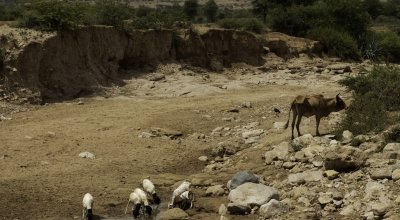
Knowledge Hub
Can we break the link between drought and hunger?

With drought looming once more in the Horn of Africa, Sally Tyldesley, our Senior Resilience Policy Officer talks about its links to hunger, climate change and how Concern is working with the people affected by drought in Somalia.
Drought: a fact of life
For many of the people that Concern works with, drought is a recurring feature of life. In the Horn of Africa, people are experiencing their fifth year of failed rains. A large part of the population in the region depend on their livestock or rain-fed agriculture for their livelihoods, so the weather has a big impact on people’s lives.
A changing climate
Drought may not be new, but climate change is changing its nature; in the Horn of Africa, it is becoming more frequent. With more frequent and severe droughts, people have less time to recover and build back before another disaster hits.
The 2011 Horn of Africa drought was reported to be the worst in sixty years, affecting around 12 million people. But, less than six years later, the region was hit by another prolonged drought affecting 13.6 million in Ethiopia, Kenya and Somalia alone.
From late 2018, Somalia has seen a succession of failed rains, combined with abnormally hot and dry conditions. Widespread crop failure and declines in livestock productivity are again pushing communities back into hunger. Today 2.2 million people are facing acute food crisis – almost 20 % of the total population.

The impacts of drought
Drought can cause large-scale crop failure and high levels of livestock deaths, combined with rising costs of food. By reducing food availability, or by making availability more unpredictable, it can be harder for people to get access to the basic diet we all need to survive. Drought can also have negative impacts on access to clean water, good sanitation and health.
The consequences of this can be severe, especially when coupled with conflict and displacement. Across Somalia, malnutrition rates remain very high, with around 1 million children acutely malnourished.
What Concern is doing
When drought hits, Concern must respond to meet people’s immediate needs. But we also work with people to try to make sure that when the next drought inevitably comes they are better equipped to cope.
In the short term, this means the provision of seeds and tools for late-season planting and, increasingly, providing people with cash transfers directly, via mobile phones. With cash, people can choose to invest in the things that will make the biggest difference to them. The majority of the money dispersed is used for food, but people will also use it for purchasing water, medicine, fuel and education.
In the longer term, we need to help people rebuild their lives in a way that makes them better able to cope with future climate shocks. Our agricultural experts are working with local farmers to diversify the crops they grow and introduce quicker maturing and drought-resistant plants. Putting in place additional water storage and introducing conservation agriculture techniques can ensure that the most is made of the rain that does fall. To reduce dependence on livelihoods vulnerable to changes in weather, we are training women and young people in running businesses.

Climate change: all of our responsibilities
The work that we are doing in Somalia will help some people better cope with current and future climate shocks. But the scale of the challenge means that we need to push for bigger and broader changes, including here in the UK.
Climate-related disasters already present a barrier to poverty eradication. It’s estimated that 100 million people are at risk of being pushed into poverty by 2030 because of climate change. Only by reducing greenhouse gas emissions can the worst impacts of climate change – which will be felt by the world’s poorest people – be prevented. We’ll also need to better prepare for and adapt to its impacts, as well as figure out how to deal with the residual risks created by climate change; those threats that it’s just not possible to adapt to.
The UN Secretary General will be holding a Climate Action Summit on 23 September this year, bringing together heads of state from across the world to build political momentum and to catalyse more urgent action on climate change. At this Summit, we’ll need to see a raising of our ambition across all of these areas.
Making resilience a priority
Building people’s resilience to such huge challenges requires resources. The UN estimates that the annual costs of adapting to climate change in developing countries could range from US$140 billion to US$300 billion by 2030. In contrast, currently only an estimated US$ 9.5bn of public climate finance is dedicated to adaptation annually. Despite the recognition that it is essential, far too little priority is currently given to building people’s resilience to the effects of climate change. Words will not be enough at the upcoming Summit; we need to see governments getting money to where it really matters.
Other ways to help
Donate now
Give a one-off, or a monthly, donation today.
Join an event
From mountain trekking to marathon running, join us for one of our many exciting outdoor events!
Buy a gift
With an extensive range of alternative gifts, we have something to suit everybody.
Leave a gift in your will
Leave the world a better place with a life-changing legacy.
Become a corporate supporter
We partner with a range of organisations that share our passion and the results have been fantastic.
Create your own fundraising event
Raise money for Concern by organising your own charity fundraising event.





